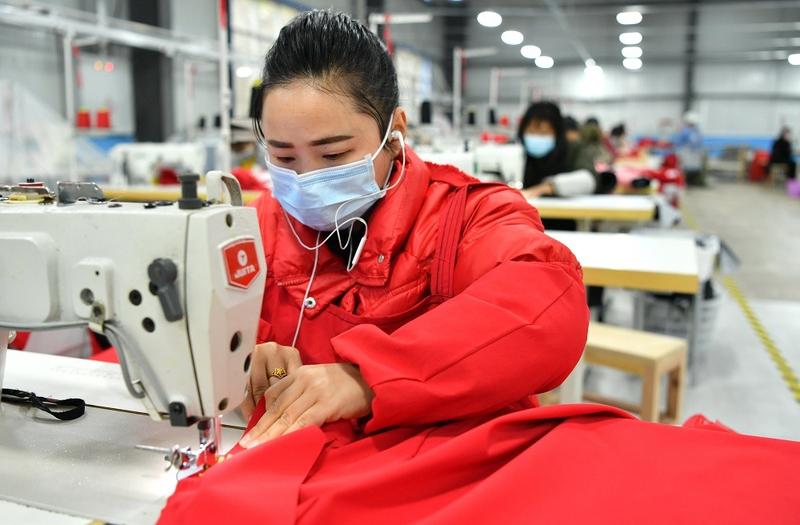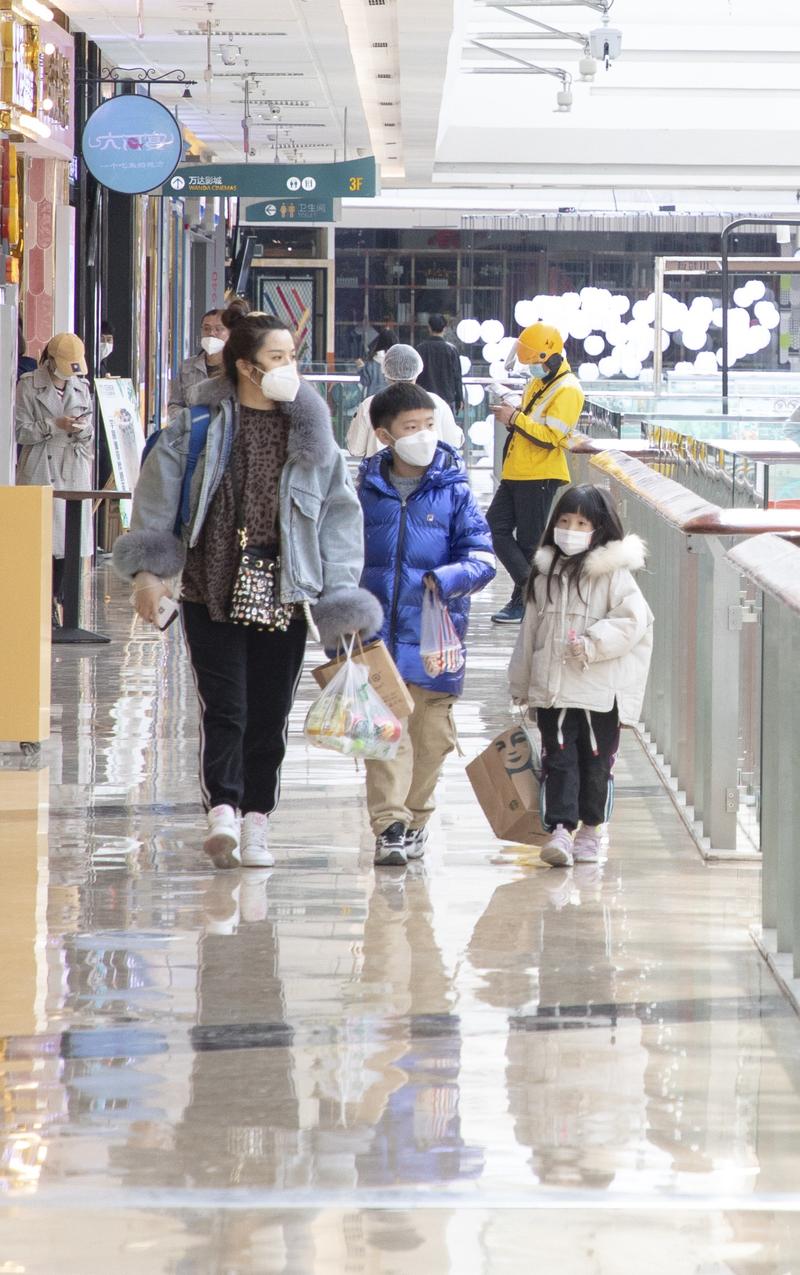 Workers wearing face masks work at a garment factory in Enshi, Hubei province, March 16, 2020. (PHOTO / XINHUA)
Workers wearing face masks work at a garment factory in Enshi, Hubei province, March 16, 2020. (PHOTO / XINHUA)
BEIJING - China pledged additional financial stability measures as the virus battered with the economy with factories, shops and restaurants shuttered across the nation.
Industrial output plunged 13.5 percent in January and February from a year earlier. Retail sales fell 20.5 percent in the period. Fixed-asset investment dropped 24.5 percent and the unemployment rate jumped to 6.2 percent, the highest on record. Property investment fell 16.3 percent.
Industrial output down 13.5%
While the epidemic has brought relatively big shocks to economic activities, the impacts are largely "short-term, external and controllable," the NBS said in a statement
China's value-added industrial output, an important economic indicator, fell 13.5 percent year-on-year in the first two months this year as the novel coronavirus outbreak disrupted factory activities and supply chains, data from the National Bureau of Statistics (NBS) showed Monday.
Output by the manufacturing industry went down 15.7 percent, while the production and supply of electricity, thermal power, gas and water reported a year-on-year decrease of 7.1 percent.
The mining sector saw output down by 6.5 percent.
While the epidemic has brought relatively big shocks to economic activities, the impacts are largely "short-term, external and controllable," the NBS said in a statement.
ALSO READ: SMEs working hard to resume production
As the spread of the virus has been basically contained, China's improving economic fundamentals and the trend of upward momentum in the long term have not changed, the NBS noted.
"The economy has withstood the shocks of the epidemic," it added.
Given that businesses have quickened pace to resume normal operations, the NBS projects economic activities will see a visible recovery in March and the second quarter as the impacts gradually weaken.
On the outlook for the second half of the year, forthcoming stronger macro policies will put the economy on steadier footing, according to NBS spokesperson Mao Shengyong.
In a breakdown by ownership, the output of state-controlled enterprises went down 7.9 percent, that of joint-stock companies down 14.2 percent, and that of overseas-funded enterprises dropped by 21.4 percent.
Output by the private sector went down 20.2 percent year-on-year.
The industrial output is used to measure the activity of designated large enterprises with annual business turnover of at least 20 million yuan (about US$2.86 million).
READ MORE: Epidemic's impact on economy to be 'manageable'
Fixed asset investment in the primary industry dropped 25.6% year-on-year, while that in the secondary and tertiary industries went down by 28.2% and 23%, respectively, according to the NBS
Fixed-asset investment falls 24.5%
China's fixed-asset investment declined 24.5 percent year-on-year to 3.3 trillion yuan (US$471 billion) in the first two months of 2020, the NBS said.
In breakdown, fixed asset investment in the primary industry dropped 25.6 percent year-on-year, while that in the secondary and tertiary industries went down by 28.2 percent and 23 percent, respectively, according to the NBS.
Private investment decreased 26.4 percent to 1.89 trillion yuan during the period, and investment in high-tech industries dropped 17.9 percent in the first two months, NBS data showed.
Fixed-asset investment includes capital spent on infrastructure, property, machinery and other physical assets.
The total property investment in the first two months of 2020 stood at 1.01 trillion yuan (about US$144.25 billion), according to the NBS
Property investment down 16.3%
China's investment in property development fell 16.3 percent year-on-year in the first two months of 2020, the NBS said.
The total property investment during the period stood at 1.01 trillion yuan (about US$144.25 billion), according to the NBS.
The investment in residential buildings went down 16 percent year-on-year to 731.8 billion yuan in the first two months, said the NBS.
Monday's data also showed that commercial housing sales in terms of floor area totaled 84.75 million square meters during the period, down 39.9 percent year-on-year, while the sales in terms of value fell 35.9 percent to 820.3 billion yuan.
 People wearing face masks shop at a shopping mall in Yinchuan, Northwest China's Ningxia Hui autonomous region, March 15, 2020. (PHOTO / XINHUA)
People wearing face masks shop at a shopping mall in Yinchuan, Northwest China's Ningxia Hui autonomous region, March 15, 2020. (PHOTO / XINHUA)
Retail sales drop 20.5%
China's retail sales of consumer goods, a major indicator of consumption growth, declined 20.5 percent year-on-year in the first two months of this year, the NBS said.
Sales of the consumer goods totaled 5.2 trillion yuan (about US$744 billion) in the two months, according to the NBS. Meanwhile, retail sales excluding automobiles went down 18.9 percent.
Retail sales in rural areas dropped 19% year-on-year in the first two months of this year, while that in urban areas decreased 20.7%
Retail sales in rural areas dropped 19 percent year-on-year in the first two months of this year, while that in urban areas decreased 20.7 percent.
The decline came as efforts to curb the spread of COVID-19 have kept most people across China indoors, and shops and restaurants were shut during the past two months.
Revenues of the catering sector, one of the worst-hit industries, fell 43.1 percent compared with the same period last year, said the NBS.
Meanwhile, online sales stayed relatively stable as consumers turned to online services when staying indoors, falling 3 percent year-on-year. Online sales of physical goods expanded 3 percent to 1.1 trillion yuan, accounting for 21.5 percent of the total retail sales in the first two months.
Further policy support will be provided to boost both consumption and investment to expand domestic demand, a key driver of China's economic growth, said Mao.
Job market stable
China's job market remained generally stable in February, with the surveyed unemployment rate in urban areas standing at 6.2 percent, NBS data showed.
The figure went up 1 percentage point from the previous month, according to the NBS.
READ MORE: China moves to stabilize employment amid epidemic
A NBS spokesperson noted that the employment situation will continue to improve as enterprises restore production order
A total of 1.08 million new urban jobs were created in the first two months of 2020, the NBS said.
The surveyed unemployment rate among the people aged between 25 and 59, the majority of the labor market, stood at 5.6 percent in February, 0.6 percentage points lower than the overall rate across the country.
Meanwhile, the surveyed urban unemployment rate of 31 major cities was 5.7 percent last month, according to the NBS.
The surveyed urban unemployment rate is calculated based on the number of unemployed people who have participated in the employment survey in urban areas, including migrant workers in cities.
It was first introduced in 2014 to better reflect the job market and serve as a supplement to the registered urban unemployment rate compiled by the Ministry of Human Resources and Social Security.
Mao attributed the rise of surveyed urban unemployment rate to enterprises' decreased demands for labors amid the epidemic. The employment situation will continue to improve as enterprises restore production order, Mao said.
He also noted that China will promote the overall stability of employment this year by supporting both enterprises and employees. The country will assist companies, especially small and medium-sized firms with hedging tools while making better use of employment funds, enhancing professional training and helping key groups of labors such as college students and migrant workers.
Housing market stable
China continued to see a generally stable housing market in February, with home prices in 70 major cities showing milder month-on-month increases, NBS data showed.
Twenty-one of the 70 cities reported month-on-month new home price gains, shrinking from 47 cities in January, the data showed.
New home prices in four first-tier cities - Beijing, Shanghai, Shenzhen and Guangzhou - stayed unchanged month-on-month in February, compared with a 0.4-percent growth registered in January, according to the data.
The country's second-tier cities saw a month-on-month increase of 0.1 percent in new home prices, down 0.1 percentage point from the previous month, while third-tier cities also witnessed a mild month-on-month rise of 0.1 percent in new home prices, compared with a 0.4-percent increase reported in January.
A NBS spokesperson said that short-term policies to support the property market are not among the government's stimulus options, reiterating that "housing is for living in, not for speculation"
Prices of resold housing in first-tier cities edged up month on month, though at a slower pace, while prices remained flat in second-tier cities and fell slightly in third-tier cities month-on-month.
READ MORE: China's property developers take steps to stay afloat
"Although the unexpected novel coronavirus outbreak has had a noticeable bearing on the country's property market, authorities have introduced a slew of policies and measures to maintain an overall stable real estate market," said Kong Peng, a senior NBS statistician.
Cities including Suzhou, Nanchang, Jinan and Haikou have unveiled targeted policies to help property firms tide over. The policies include credit support, financing cost cuts and deferred payment of land transfer fees.
China's investment in property development plunged 16.3 percent year-on-year during the first two months. Investment in residential buildings fell 16 percent from a year earlier, NBS data also showed.
Mao reiterated that "housing is for living in, not for speculation," adding that in accordance with the requirements of high-quality development, short-term policies to support the property market are not among the government's stimulus options.
Chinese property developers and realtors have been biting the bullet with grit and wit to survive and thrive. Some adopted virtual reality salesrooms and livestream marketing, while others announced price cuts to lure customers.
China Evergrande Group, one of the largest developers in China, offered a 25-percent discount for all property sales from Feb 18 to 29 and lowered its housing deposit threshold from 5,000 yuan (about US$714) to 2,000 yuan starting March.


